|
Your new movie The
Summer of Massacre - in a few words, what is it about?
The
Summer of Massacre for me ... if you want me to give you a synopsis, you know, that can be
found on any review of the film - but for me, The
Summer of Massacre
is about finally gratifying the childhood dream of making a motion
picture or watching a motion picture that has everything in it I like to
see.
|
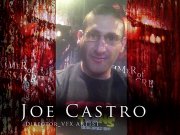
|
Growing up, at the age of 11 my best friend was a 33 year old man,
he was my third cousin, Eddie Perez, I met him at a family reunion, and he
had a twin, Ernest Perez, and they had the most astronomical collection of
horror films. This was in 1981, and VHS and Beta were out, and they
introduced me to horror films and in one summer I must have seen almost
every horror film made. So I was educated by Eddie and Ernest Perez. And
we would always try to find films or look for films that had the most
unique and original ideas and had the most graphic and intense special
effect sequences - even if they weren't horror, just bizarre stuff ... so The
Summer of Massacre
was finally being able to take what I liked from all that summer of
watching all those films and just selecting what I liked about them and
putting it into this one motion picture. Unfortunately, Eddie died last
year and never got a chance to see this film - and that's why The
Summer of Massacre is dedicated to Eddie Perez.
The Summer of
Massacre is a Guiness-certified recordholder for containing
the highest bodycount (155) ever achieved in a slasher film - was this
something you at all aimed for, and why does your movie contain quite so
many killings? It was one of the aspects of preproduction
that I heavily considered at the beginning. I wasn't sure what I was going
to do with it. At first we were considering using the most blood ever used
in a motion picture, and I thought "how can we possibly do that and
what angle would we approach that as a marketing pitch and presenting it
to the Guiness record staff?" And then it kind of fell to the
wayside, it wasn't important during production. But once production ended
and it became time for post production, my mind started clicking again and
I realized I had something here that could be looked at and could be
merited. You were also responsible for your
movie's gore/special effects. Would you like to talk about those for a
bit?
|
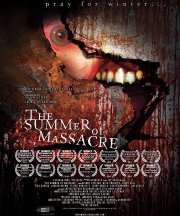
|
I really don't have much to say about them, I have
spent most of my life doing gore and special effects and, you know,
working on a film of this caliber - and by caliber I mean very low budget
- it's very difficult to wear as many hats as I did on set and in post
production and being able to focus on making sure that every aspect of the
film is of the highest quality to your standards and your ability in a
short amount of time. That's my biggest problem, I'm always racing against
time, and when creating special effects, they take time, especially
physical effects, effects that are executed on set - that is my greatest
joy and my greatest love, above all, creating physical effects on set,
always has been and always will be, but ultimately, I'm racing against
time, especially when I'm on somebody else's set. And when I'm on my own
set, wearing so many hats as a director, as a writer, as a casting agent,
as a caterer sometimes, I have to delegate authority to which hat I should
wear at what time and basically schedule my effects so they fit into just
the timeslot that they need to be serviceable. I'm hoping that with my
new skills as a digital effects artist, I will be able to compliment what
little time I have on set in order to augment them and bring them to a new
level in post production. So I must say just in general that the gore
effects that I have that are in The
Summer of Massacre as a whole, I think because they all have a
very stylized look, I think it works well. I think it will not reach as
broad of an audience if I had done them all physically. Why? Because,
to be honest with you, there are so many people that would have been
turned off by so much gore if it was a physical effect. Because I've done
it very stylized, à la these graphic novel films that are coming out.
They are done with a lot of CGI. For me, the violence in The
Summer of Massacre is rather cartoonish, with a sprinkle of
Herschell Gordon Lewis [Herschell
Gordon Lewis bio - click here]. Do you at all agree, and would you
like to elaborate on that? I agree it is in many instances
rather cartoonish. Cartoonish in its look and in its dynamics in physics,
and I explain why they are: Originally they weren't meant to be, but
during the making of The
Summer of Massacre I was going to college to learn CGI, to learn
computer generated effects. At the school where I went to college, I took
a course in motion graphics, that was the main course that I was taking.
Motion graphics is compositing moving texts and moving objects and using
effects in Adobe's After FX. So it was a four-year program
in 11 months. Additionally I had to classes in MIA, which is a
modelling program. When I came out of that school, the tools I had were
tools that were commonly used in opening title sequences and commercial
looks and anything but horror-related computer-generated effects, they
were very glossy, very pretty, very commercial, and corporate effects ...
so those were the tools I had coming out of that course, and it was very
difficult for me to go to school and make The
Summer of Massacre at the same time. But I did it, and as I look back
on the summer after I got out of school and completed, posted The
Summer of Massacre and realized that my teachers in school, their
morals, their values and their look of the class, and what the class
considered to be effective and commercially viable were then implemented
into my film just by osmosis. I hope that makes sense. But I do agree
that there are slightly cartoony and ... er ... you also have to realize
that, if you are a horror buff, it looks this way, but if you're not a
horror buff, it looks rather twisted and concerning that someone would
make a film that looks rather cartoonish with so much pain and grotesque
imagery. The
Summer of Massacre is an anthology film. What made this format so
appealing to you?
Slasher films are by nature a person, a
human being stalking innocent - or not innocent - victims one-by-one and
killing them ... or one-by-two, whatever ... anyhow, stalking people and
killing them. Normally, some twisted maniacal, mongoloid, whatever. I
personally have countless ideas for slasher films and I wanted to make a
slasher film - but I couldn't decide which idea. And then there's also the
YouTube-generation whose attention span is that of a mosquito ... and I
realized, why would you want to go see a 2 hour motion picture with 13
deaths - that's the remake of Friday
the 13th - when you can see a 90 minute motion picture with 155
deaths. So I tried to make the film appealing to today's younger
generation and also got to tell a selection of stories I was ready to tell
at that time, that interested me - hope that makes sense. What were your sources of inspiration
when writing The
Summer of Massacre? My sources of inspiration were
pulled from many of my life experiences: Lump was pulled from an
actual cousin of mine, and how my family and others interacted with him.
Not particularly the exact same way but in many ways I saw my cousin Glen
Garcia being viewed and treated the way that Lorie is in the film, and the
body casing that Lorie wears in the film is specifically designed after
the way Glen had to wear one. And ... Glen was also a medical miracle, he
had spina bifida, and he lived a very long life for someone with spina
bifida. In fact doctors from all over the world were coming when he was in
a hospital and study him. I think most children with spina bifida don't
live past the age of 10, and Glen lived many many many years, well into
his ... double that ... Burn: All I have to say is, Burn
is a ... it's also from my family, I have a brother who's a firefighter,
and ... it's very personal, it's very difficult to explain, but I'm sure
that there is hazing, and there is corruption, and many many bad things
happen in many different ways in a fire department, it's such an elite and
select group of people. I think most firefighters consider themselves
superheroes, they consider themselves police officers, they consider
themselves authorative figures, and I'm sure many firefighters can become
abusive, can become secretive - and I'm not saying that my brother is, but
I'm just saying that my experiences with what I know are an accumulation
of what would happen in a situation where two gay firefighters would have
to live in secrecy ... horrible things could happen. The
Summer of Massacre features genre veteran Brinke Stevens [Brinke
Stevens interview - click here] in an
extended supporting role - how did you get her and what was it like
working with her? Brinke and I became friends when I first
met her back in 1986. I had won an international makeup effects contest
that was sponsored by Monsterland Magazine, and that was produced
by Forrest J.Ackerman - the Forrest J.Ackerman. And I had my picture taken
with Brinke, it was to be in the magazine, and when we were at the photo
session, there were many people there who I'm still in contact with today
here in Los Angeles and that I'm very good friends with, Steven Ray, Ken
Hall, Jim Keegan, Brinke, and James Van Heis. We were there, and ... I am
an openly gay man, and everybody at the photosession knew that I, at the
age of 16, was gay, except that I didn't know that - and they were so
loving and so warm and so kind to me that I knew that the first chance
that I got to come back out to Los Angeles, it was the place I needed to
be. In fact, my mother was there with me on the trip and it was very
incomfortable there with my mother because everyone around me wanted me to
be myself and I was being secretive and holding back who I really was - it
was because of my mum was there -, but I've never experienced people who
were so loving and kind to me, and I knew that there was something here
and now I have an extended family here in Los Angeles, the likes that I
can't describe, and that's Brinke's extended family to me. And that's
how I got her, I called her, I emailed my sister and said "Brinke,
would you please please be in my film?" and she said yes. And as a
matter of fact, I have something in the works with Brinke right now - it's
pretty wild and very hush hush, but I will say that Brinke is going to do
something amazing this year, and she's allowing me to produce it. What's
it like working with Brinke? It's like working with royalty, it's like
working with Julia Roberts, it's like working with Merryl Streep. You
don't have to tell her or explain to her, or say anything, she just comes
in on set and she impresses you, and she wows you, and she does what she
does best. A few words about the rest of your
cast and crew?
|
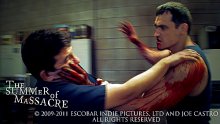
|
The film didn't get into the Guiness Book
of World Records because I made the film, because it was 155 people
involved in the film. I could point out a couple of people that I can
think of at the top of my head but that would really be short-changing
everyone that was involved. I know that everybody who was involved was
really willing to do the work of anybody that was involved. And that's the
way it appeared on set, that's the way it appeared all the time when it
came to completing the film and getting it to the consumer. I'm just very
humble and very grateful that everybody that's in the film is in the film,
and it was an experience that I will never forget. Of all my films
this was the most harmonious and brotherly, and there was such amazing
talent. There were actors that doubled as producers, there were actors
that doubled as boom operators and as gaffers and as assistant directors
and there were actors that doubled as directors at times, there were
actors that doubled as on-set storywriters when we needed some dialogue,
you name it, they were hands on and really involved. I can't help it, I
just have to give a shout-out to the group of young men that were in burn
that laid on the ground for an hour in the cold in my backyard while I
poured paint and blood and gelatine and crinkled, burnt-looking aluminium
foil all over their bodies while we did those shots of Lauren Boehm
walking through the burnt woods. Thank you so much, guys, for coming out
and making that scene happen. What can you tell us about critical and
audience reception so far?
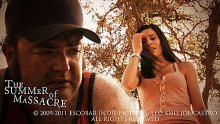 |
I can tell you that all the
awards that it has won so far, the likes of which I never expected - if
you go to thesummerofmassacre.com,
I think it's on the first page you can see that it has received very many
awards, I think it's over twenty by now - I never expected that in my
wildest dreams, and the height of the merits are something I never
expected either. And the merits in the film come from the post-production
management and supervision and PR representation of my partner Steven
Escobar. Without Steven Escobar I doubt that we would even be conducting
this interview, even if I had made the film on my own. Steven took
initiative to make sure that festivals had the film and had a chance to
look at it, and he took initiative to make sure that Guiness had
the film and had the submission and had the chance to consider it. Steven
has done an amazing job as an executive producer - I don't think I could
ever ask for a better one. Steven never questions my creative ability or
my creative decisions concerning my stories and on set, no matter how
outrageous. So The
Summer of Massacre thanks to Steve is truly 100% Joe Castro - and
that's why I like to call it "A Joe Castro Experience". Let's go back to the
beginnings of your career for a bit: What got you into filmmaking in the
first place, and did you receive any formal education on the subject?
What
got me making into films? My father Martin Castro jr. One weekend, when I
was 7 years old, my father was taking care of me, my mother and my brother
were away for the weekend, and he was splitting wood, basically making
firewood outside, which can be dangerous, so instead of having me outside,
he sat me in front of the television on a Saturday afternoon and said
"Watch this, you're gonna like it!" And by that time, I was
really fascinated with dinosaurs, everything for me was dinosaurs. And so
he sat me down to watch a creature feature on Saturday afternoon - and the
movie was Godzilla vs
the Smog Monster. And for that duration of themotion picture - and
it was the first time I ever watched a movie by myself, let alone a motion
picture that was sci-fi/horror related at the age of 7. I lived on a goat
ranch out in Halodus, Texas, and by the time, for the duration of the
picture, from the time it started to the time it ended, I was lost in a
world that I had never experienced. And when that movie ended, I did not
want it to end, ever, and knew that I had found my calling. I knew at that
moment that I wanted to be a special effects artist and a motion picture
director. And my dad knew that I would like Godzilla,
he knew that I would like it simply because of the reptile dinosaur
aspect, and he knew that I had a love for art, and I have to consider my
dad the reason for me to direct and produce motion pictures and special
effects.
|
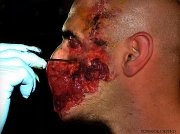
|
Besides
writing and directing movies, you have also made a name for yourself as a
versatile makeup and special effects artist. Would you like to talk about
that aspect of your career for a bit? When I was 12, my
parents - my father was a goatfarmer, my mother was a schoolteacher -,
between both their incomes, and I also had an older brother who they took
care of, they bought me the first retail videocamera that came out on the
market in 1982. It was a JVC camcorder. The videotape didn't fit in
the camera, you wore the actual deck on your side and the deck was split
into two decks, one of them connected the deck to the television, and the
second deck would hold the tape, and that deck went with you and the
camera, wherever you film, and then you would have to take that deck off
the camera and put it back onto the deck that actually fed the information
into the television. So when they bought me the videocamera, the first
thing I wanted to do was create something visually that I could
photograph, à la special effects. So fromt he beginning I was always
producing motion pictures based on special effects, and I think it's
probably always going to be that way. Your first feature
was called I believe Ceremony. What can you tell us about that one,
and lessons learned from it?
|
|
 |
|
|
 |
|
|
Hmmm ... it's a deeply
respected film by many of my peers, which is really all I ask, that my
peers look at my work, not so much respect it but consider it, and that
first feature I think has never gotten a bad review. At least I haven't
read one. And I'm soon going to re-release Ceremony with a brand
new digital makeover - kind of like the way the Star Wars-episodes
were re-released. There are lots of special effects in the story, in my
original vision of Ceremony that never made it to the final part.
And I'd like to give everyone an opportunity to look at that film and look
at it the way it was originally intended to be. I'm all for remakes and
all for updates, but this film would truly be polished in a way that it
was originally intended so I won't be destroying something that was
perfect the way it was - it still needs a lot of work, and I think it's
worth it and it's necessary, it's part of the process - and I can't wait
until we really start, hopefully in the next year or two. Lessons
learned from it? Making a motion picture by yourself, or completing a
motion picture by yourself as the director and producer without the help
of anybody else involved - it took me about 2 1/2 years to complete that
film, and in the process I lost myself, I lost a lot of self-assurance,
and it was very difficult, it's a very painful process. And that's why I
don't make movies alone anymore.
Any other films of yours
you'd like to talk about? Hmmm ... I could pay myself on
the back and go on about several of my films, but I think that as a whole,
I would just like to say that when making a motion picture - these are
great words of wisdom that came from a fellow peer of mine, special
effects artist and director Mark Villalobos: "You don't want to look
back on your career to realize you made the same motion picture over and
over again!" So if you take a look at my films, they may all have a
similar look, but I try to not tell the same story over and over again. I
try not to do anything that isn't truly original. And in doing so, it's
very difficult to get the world to accept something that is truly original
and truly different. Most do not understand what it is, because it doesn't
look like the cookie cutter Hollywood films, and most would consider it
trash. But one thing about my films, the people that watch them either
like them and respect them very very much - or they want to burn
them. I was told once 80% of the people who watch your film have
an opinion. 40% right off the bat hate it, 40% right off the bat are
entertained by it as a whole, and 10% really don't consider it - so I
already know that about half the people who are going to watch The
Summer of Massacre are not going to like it or understand it, and
those that do ... I'm glad! Any future projects? I've
already realized, now at the age of 42, there's just not going to be
enough time in one lifetime to create all the motion pictures that I want
to, that I have in my head, the ideas. So I have to be really selective
about which projects come next and what I'm spending my time on. And to be
honest with you, it's a daily decision about what to focus on and what to
put all my efforts into. Right now I'm producing a short format film, and
it is a remake of something I produced in 1994. It's actually a music
video, a musical interpretation of a science fiction movie produced in the
early 1970's and it's set to music. I will be scoring the music myself,
and I'm producing and directing and posting the entire piece with Steven
my partner. It's definitely something truly original, something I don't
think anybody has ever seen ... I'm also in pre-production to begin
filming Terror Toons 3, and portions of it will be in 3D. I'm not
sure what format of 3D it will be in, but it will definitely be
three-dimensional. Special
effects artists who have influenced you? Lon Chaney sr - I
don't think he's forgotten, I think many people know who he is and what he
did. But I don't think many modern special effects artists, young people
coming into the business, understand what Lon Chaney sr did. The man was
not only a special effects artist, he was a visionary, an illusionist, he
made special effects special. I think that's one thing that Hollywood is
missing in most of htese epic motion pictures where countless and
countless millions of Dollars are being dumped into. There's nothing
special about those special effects, they're old hat and they are obvious.
And when you go see a motion picture, I think the one thing that's the
most disappointing to me as a viewer is the obvious. If I'm paying money
to see a motion picture, especially a horror film, a special effect comes
up and it's obviously coming up, where't the excitement, where's the
escape, if I'm in my head recognizing what it already is, being able to
pick it apart. Lon Chaney sr I would say is my true one influence. I
mean there are people like Tom Savini. Tom, who actually took the time to
explaining me over the phone as a young man how he produceed things in the
motion pictures he was currently working on when he lived in Pittsburgh. I
would call him on the phone back in 1983. You could actually call
information and say "Pittsburgh please - I'm looking for Tom
Savini" and they would give you his home number. And Tom took the
initiative to explain to me many many special effects. Tom was a big
influence, and he still is to day, and I hope I will work with him
personally one day. Dick Smith, Rick Baker, Rob Bottin, all the greats,
they were there, and they impressed me as a child and still impress me
today. John Caglione - some of the things he did in Amityville
II: The Possession blew my mind, that's exactly what I wanted to do,
and I wish I had more time to focus strictly on physical effects, but when
you're writing and producing and directing and creating physical effects
on such a small budget that I work with, it's easy for others to point and
judge, like they do with most of my films, but ultimately, what I try to
do is make a motion picture that at the end of the day I can sit back and
watch by myself and be entertained. So in truth, and that may sound a
little arrogant, I'm not making the movies for anybodey but myself.
Movies
that inspire you?
I kind of pride myself on this because I
do have a top five, an actual top five. The number one motion picture
that inspires me to this very day is the film Rabid,
a film produced and directed by David Cronenberg. It is so ahead of its
time and so extremely disturbing and dehumanizing and interesting, truly
original, the special effects are ghastly even to this day, and it stars
one of my favourite actresses, wish I had had a chance to work with her,
but she passed away last year - Marilyn Chambers. Rabid
was the kind of film for me as a child that stood out because - for one my
parents didn't want me to record it because it was rated R and had some
really bizarre things in it, but also it explored ideas that I hadn't even
begun to encounter as a producer/director/special effects artist, even as
a person, whe I first saw it. It's a bizarre movie, and done highly
realistically, something I always try to achieve but I never quite seem to
get there.
Then of course there's Poltergeist, the
original, big influence. The
Gates of Hell, Lucio Fulci's masterpiece [Lucio
Fulci bio - click here]. And this one might take you by
surprise, it's a movie that's not a horror film, it's called Return to
Paradise, it's drama. I can't explain it if you haven't seen it, but
it's a film that emotionally is special, as a special effect in horror,
it's an emotional special effects horror experience. I don't know how they
did it, the gift of that director, that screenwriter and those actors to
produce an experience of watching a motion picture that pulls you into the
feeling of utter captivity and fear of death is Oscar-worthy and totally
incredible.
 |
Feeling lucky?
Want to
search
any of my partnershops yourself
for more, better results?
(commissions earned) |
The links below
will take you
just there!!!
|
|
 |
Number five is always the one that slips from me,
could be several things, so I'm going to have to say Blood
Feast, Herschell Gordon Lewis's motion picture and the beginning
of all gore effects [Herschell
Gordon Lewis bio - click here]. My hat off to Herschell Gordon
Lewis for paving the road for all of us who've come after him, including
the Friday
the 13th-franchise and the Halloween-franchise
and the Freddy
Krueger-franchise and the Texas
Chainsaw Massacre-franchise. Every one of these franchises
should pay some kind of tribute or hommage of money to Herschell Gordon
Lewis for showing us how to produce a slasher film, and to kill your
victims one by one and then have your killer's death be the most gruesome
demise at the end. That is what Herschell Gordon Lewis did for us, and I
think most people never realize that that's what Herschell has done. So
everybody, Herschell did it first, he will always be the first, and that's
why he will always be the Godfather of Gore. Anything else you are dying to
mention and I have merely forgotten to ask? Just want to
say if anybody out there wants to hire me to create special effects or any
sort of visual effects, the great internet allows me to do that anywhere
in the world, so even if you're not in Los Angeles and you'd like me to
create some visual effects for your motion picture, or makeup effects for
that matter, I can produce them here in LA and intertwine them with your
film footage via the internet now with computer technology. You can
reach me at facebook.com/joe.castro You can see most of my makeup
effects at myspace.com/joemcastro Thank you for the interview! Peace. Thanks for
the interview!
|